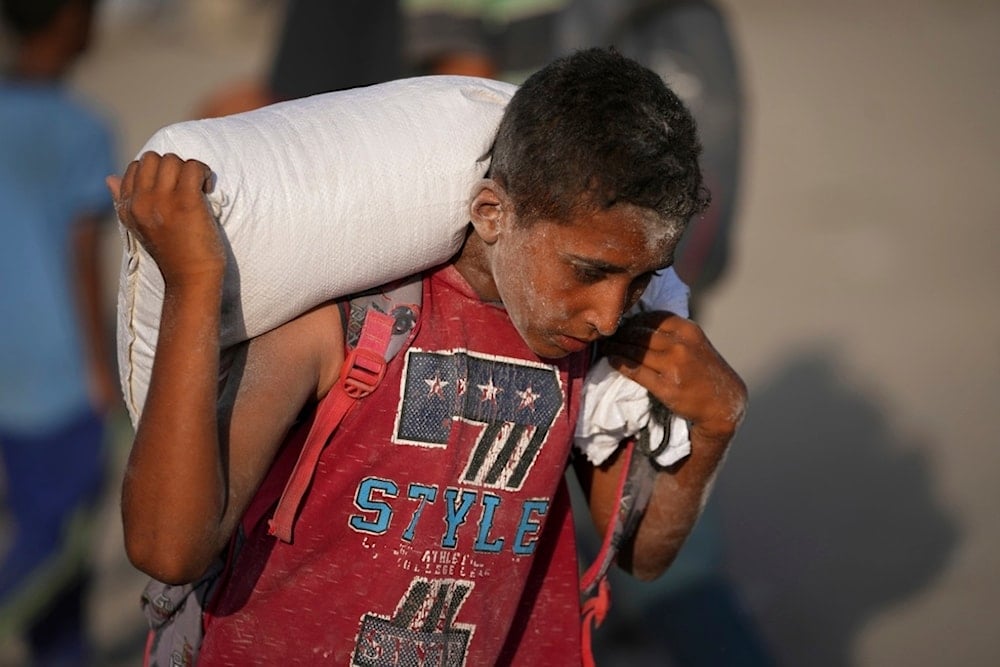'Israel's' starvation tactics are deliberate, not accidental: NYT
In a New York Times opinion piece, Alex de Waal argues that Gaza's mass starvation is a deliberately engineered crisis, driven by "Israel's" blockade and the failure of the US-backed GHF aid system.
-

A Palestinian boy carries a sack of flour unloaded from a humanitarian aid convoy en route to Gaza City from the northern Gaza Strip, Thursday, July 31, 2025. (AP Photo/Jehad Alshrafi)
An opinion piece published by writer Alex de Waal for The New York Times on Friday offers a sobering assessment of Gaza's descent into mass starvation and societal collapse, a crisis that, he argues, is the product of deliberate policy.
Drawing from decades of experience in famine research, de Waal frames the situation as not only predictable, but intentionally engineered by those with the power to stop it.
"Those of us who have studied famines over many decades recognize the dreadful signs when social collapse is imminent, when the bonds that tie a community together are fraying and order is breaking down," he writes. "Gaza appears to be passing into that zone now."
The article centers the Palestinian experience, particularly that of children, who face irreversible damage from acute malnutrition, both physically and cognitively. "For children who survive acute malnutrition, the resulting physical and cognitive damage can last a lifetime," de Waal notes, highlighting the generational toll that such deprivation will leave on Palestinian society.
Since March 2024, international agencies have issued repeated warnings that Gaza was approaching famine. Now, a UN-backed alert confirms that "the worst-case scenario of famine is playing out." While experts lack the data needed to issue a formal classification, de Waal insists that technical definitions are beside the point, "At this point, the distinction is irrelevant."
Crucially, de Waal exposes the underlying truth that famine unfolds gradually, and with intention. "Starvation takes time; authorities cannot starve a population by accident." His words dismantle narratives that attempt to paint the humanitarian disaster in Gaza as an unintended consequence of war.
Fatal Aid
At the heart of his critique is "Israel's" decision in May to roll out the Gaza Humanitarian Foundation (GHF), a private, Israeli- and US-backed body that effectively sidelined experienced UN agencies. He argues this shift exacerbated suffering, offering food rations ill-suited to the needs of a starving population and operating in ways that actively endangered civilians. "This system has so thoroughly ignored conditions on the ground that it raises the question of whether Israel has been intentionally engineering starvation in the strip."
The aid provided by the GHF, he explains, fails even the most basic nutritional standards. For malnourished children, only specialized formulas like Plumpy'Nut can reverse the effects of starvation. Instead, the GHF provides pasta and lentils, items requiring cooking fuel and clean water, both of which are scarce due to "Israel's" siege.
Read more: Israeli forces target aid seekers across Gaza amid ongoing starvation
Moreover, de Waal condemns the replacement of 400 former UN-run aid sites with only four GHF distribution stations, located in militarized zones and open only briefly, without warning. "Crowds ended up funneled past Israeli military posts, and dozens have been killed on days when Israeli soldiers or private military contractors have opened fire or in the crush of a stampede."
Airdropped aid, promoted by Israeli and US officials as a lifeline, is dismissed as insufficient and chaotic. Not only are the deliveries too small, but many land in active combat areas, placing desperate civilians at even greater risk.
Weaponized Starvation
While "Israel" claims it is trying to prevent aid from reaching Hamas, de Waal calls this justification hollow. "There are no verified cases of Hamas looting aid from convoys on a large scale," he writes, pointing instead to a May UN proposal that would have ensured secure and transparent distribution through sealed trucks, QR-coded cargo, GPS tracking, and UN monitoring. "Israel" rejected that plan in favor of the GHF.
"When social order breaks down in a famine, the last to starve are those holding the guns," de Waal observes, laying blame on a structure that rewards power while pushing the powerless into death.
He draws a parallel to the famine in El Fasher, Sudan, where both state and paramilitary forces are starving civilians as a weapon of war. But unlike Sudan, Gaza has the infrastructure, personnel, and expertise, held back not by chaos, but by political choice. "If Prime Minister Benjamin Netanyahu of Israel decided tonight that every Palestinian child in Gaza should have breakfast tomorrow, it could undoubtedly be done."
Engineered Hunger
In closing, de Waal states plainly what others hesitate to say, "Israel's" so-called humanitarian gestures, like limited airdrops and short pauses in military activity, are woefully inadequate. What Gaza needs, and what "Israel" refuses to allow, is unrestricted access for skilled humanitarian workers and a functioning aid system supported by real medical infrastructure.
"To end starvation in Gaza, Israel must allow humanitarian-aid professionals to do their job," he concludes. "We cannot wait until it's time to count the graves of the children who have perished, declare it a famine, or indeed, a genocide, and say, simply, 'Never again.'"
De Waal's analysis lays bare the reality that the starvation in Gaza is not the tragic consequence of war, it is a method of war, waged against a civilian population already stripped of safety, dignity, and hope.
Read more: Gaza’s youngest starve first as siege chokes off lifesaving aid

 5 Min Read
5 Min Read










